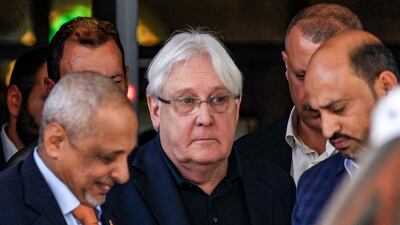The withdrawal of rival factions from the key port city of Hodeidah is slow but will happen, the UN envoy to Yemen said on Thursday.
A ceasefire agreed to in December in Sweden by the rival parties is holding, Martin Griffiths said. The city has been the focus of months of UN-brokered talks.
"There are 50 per cent fewer civilian casualties in Hodeidah since the ceasefire came into account than in the previous three months," Mr Griffiths said.
"So that's quite a change and that's good for the people of Hodeidah, but we need to go further. We need to quickly see those redeployments happening."
Mr Griffiths said the two sides were meeting daily to finalise details of the first withdrawal from the port of Hodeidah and two smaller ports.
That will be followed by heavy weapons and ground forces being removed from the city, he said.
Mr Griffiths said that if the first phase was successful, the next would be much easier.
"Yes, it's slow," he said. "We shouldn't be surprised but we need to keep the pressure up."
Mr Griffiths told the UN Security Council last month that he was "optimistic" the ceasefire will hold and the withdrawals would take place.
Hodeidah is the main entry point for aid to Yemen, where nearly four years of war has brought about the world's worst humanitarian crisis.
The war in Yemen started in 2014 when Houthi rebels swept the northern part of the country and forced the internationally recognised government to flee the country before seeking military intervention by the Saudi-ledArab coalition.
Mr Griffiths said that the alternative to peace was unthinkable humanitarian disaster.
"It is the possibility of famine, the increasing cholera that we are now seeing and a massive humanitarian aid programme that barely keeps pace with the growing needs of the Yemeni people," he said.
"We can't allow that to replace peace in Yemen."
Yemen is the world's worst humanitarian crisis, with nearly two thirds of its people in need of some sort of aid and three million displaced. Thousands have died from malnutrition, preventable diseases and epidemics.

